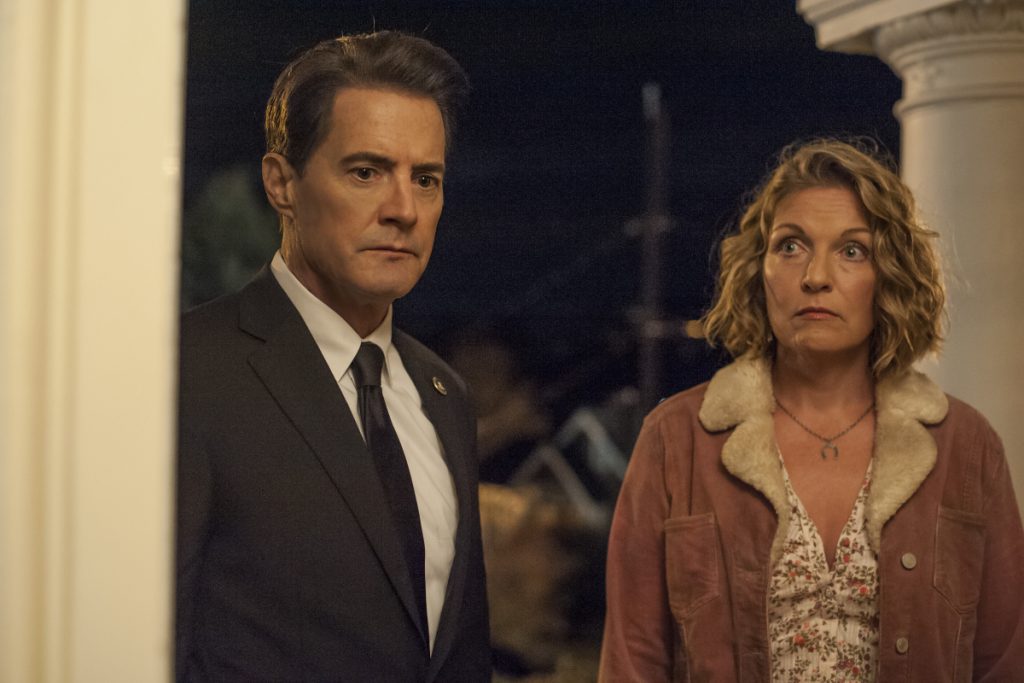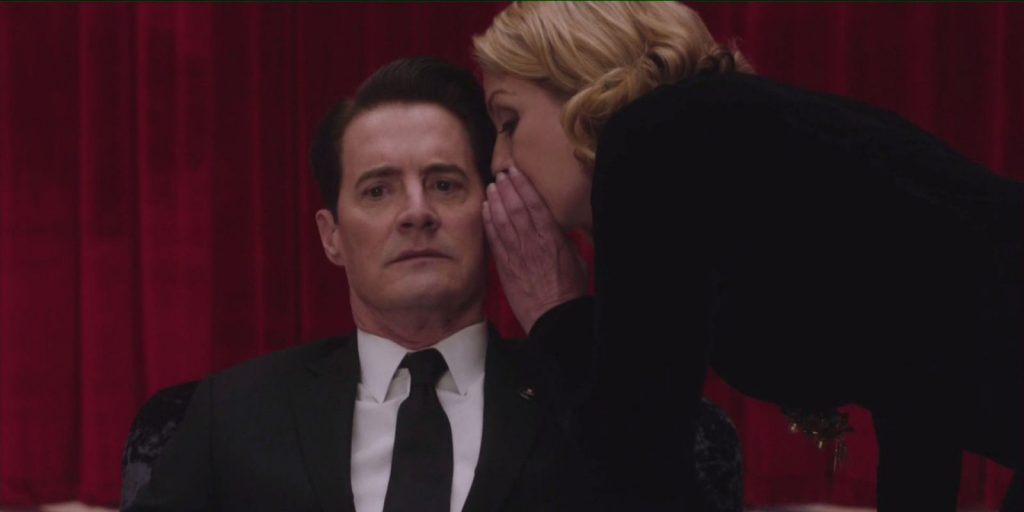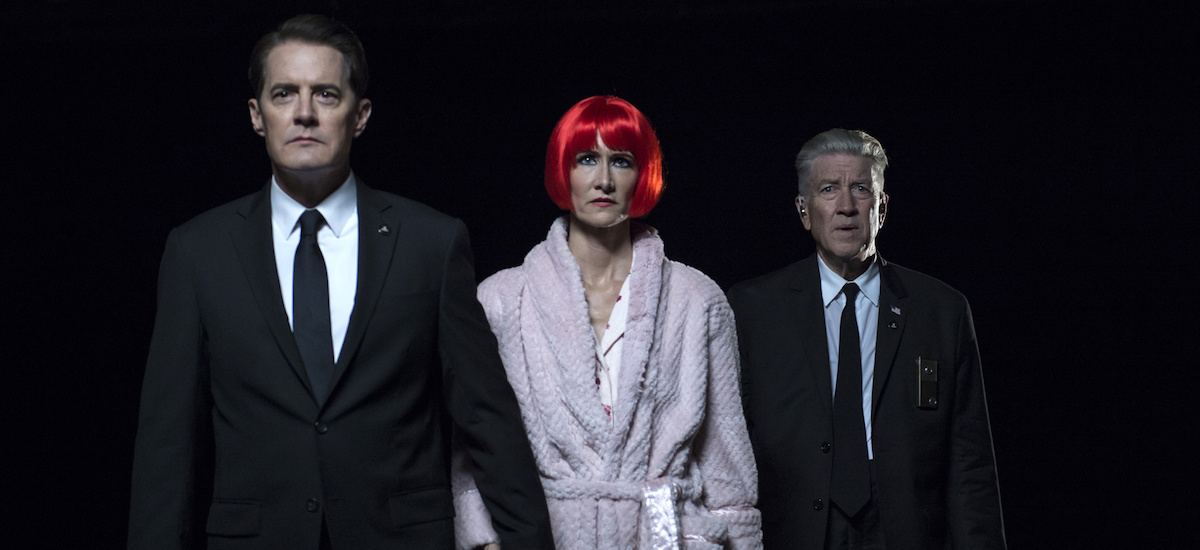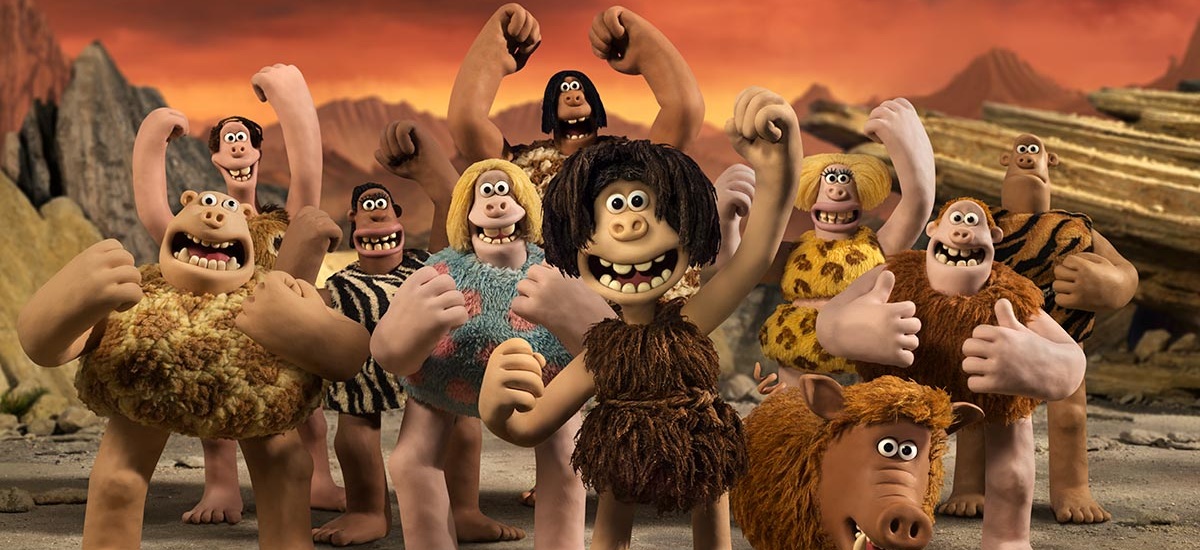Was last night’s “two hour” Twin Peaks finale really a finale? Technically, yes. In total, it was two hours long and it was the end of the limited series run. However, if you want to argue with semantics, it was really just two one-hour installments, clearly divided by end credits of one and opening titles of the next. Normally, I wouldn’t dispute the point. In this case, though, the two hours are so different that a dividing point occurs naturally, anyway.
The first hour continues the high from last week, very quickly moving the story forward, answering questions, and providing a number of rewarding moments that have been building from the previous 16 hours. It may have left questions remaining; however, I would have been more at ease with its cliffhanger ending than I am with the second hour’s. I don’t believe David Lynch and Mark Frost want us to be “at ease,” though.
How else can you explain a second hour that puts on the brakes and begins creating new questions rather than answering existing ones? It’s basically a showcase for three characters, Agent Dale Cooper (Kyle MacLachlan), Diane (Laura Dern) and Laura Palmer (Sheryl Lee), and much of it happens during long, silent car rides down lost highways. At the end of the final hour, I have a much harder time believing this is the end of Twin Peaks. I should restate that. I have a much harder time accepting this is the end.
Let’s backtrack and discuss both hours. I’m not going to provide any speculation about the first hour. At this point in the story, you’re going to either have concocted your own theories about what is happening or not. For me, it was remarkably straightforward and I am comfortable with what I believed happened and what it all meant…
The first hour begins as several hours have begun, with one of the members of the Blue Rose task force explaining a chunk of story about which we may have speculated and already drawn our own conclusions. In this case, after toasting the FBI with a glass of red wine, Deputy Director Gordon Cole (Lynch) says, “Now listen to me.” Long… long pause. “For 35 years, I’ve kept something from you.” What he reveals comes so fast that I’d have to watch again to catch it all.
In essence, Phillip Jeffries, whom we know now exists in a different state of being (yeah, as a teapot), discovered an “extreme negative force,” called “jow-de” (uncertain of spelling), or, “Judy.” During the last conversation Cole had with Cooper, Cooper told him if he ever disappeared, he should do everything he could to find him. “And now this thing of two Coopers…” A paid informant, Ray Monroe, was looking for coordinates from Major Briggs.
Just as Cole says they should have heard from their beloved Cooper by now, Bushnell Mullins (Don Murray) enters with the note Cooper gave him during the last hour. In part, it says that he is heading for the Twin Peaks sheriff’s station and that 2:53 adds up to 10. Cole says, “Pack it up. I know where he’s going.”
The next 30 minutes or so takes place in the Twin Peak’s sheriff’s station with a series of scenes alternating among the inhabitants of the jail: Chad (John Pirruccello), the drunk (Jay Aaseng), James Hurley (James Marshall), Freddie Sykes (Jake Wardle) and Naido (Nae), as well as local law enforcement agents Frank Truman (Robert Forster), Hawk (Michael Horse), Bobby Briggs (Dana Ashbrook), Andy (Harry Goaz) and Lucy (Kimmy Robertson), as well as Dale Cooper and Bad Cooper.
Interspersed early is one scene in which Ben Horne (Richard Beymer) receives a phone call that his brother, Jerry (David Patrick Kelly), has been found naked in Jackson Hole, Wyoming. Horne is going to make arrangements for him to get home… and he’s going to send clothes.
After entering a vortex in the woods, Bad Cooper uses a quick visit with the Fireman and the head of Major Briggs to transport to Twin Peaks. Following the initial, excited confusion from Andy and Lucy that Cooper has returned, the real Cooper arrives for the long-awaited confrontation with his tulpa. Everyone, and I mean everyone, including the Mitchum Brothers (Robert Knepper, Jim Belushi), “the Andies” (Amu Shiels, Andrea Leal, Giselle DaMier), and the Blue Rose task force, witness the demise of Bad Cooper.
Oddly, the real Dale Cooper has very little to do with this demise. He’s taken down with a shot from an unexpected person, then torn apart and bloodied by the woodsmen. This releases Bob in a floating sphere, allowing Freddie to fulfill his destiny with the green glove fused to his hand. Cooper puts the ring on Bad Cooper and he fades away, the ring dropping to the floor of the red room. The takeaway may very well be that Lucy now understands cellular phones. Savor this moment; it’s the last we’re going to have with most of these characters. Cooper addresses them, “Now there are some things that will change. The past dictates the future.” It’s then revealed that Naido is indeed Diane (Dern). She, Cooper and Cole depart for the next part of this adventure, using the Great Northern Lodge room key to access a door that opens to the “bridge” above the convenience store. Before leaving, though, Cooper tells everyone, “We live inside a dream. I hope I see you all again, every one of you.”
Savor this moment; it’s the last we’re going to have with most of these characters. Cooper addresses them, “Now there are some things that will change. The past dictates the future.” It’s then revealed that Naido is indeed Diane (Dern). She, Cooper and Cole depart for the next part of this adventure, using the Great Northern Lodge room key to access a door that opens to the “bridge” above the convenience store. Before leaving, though, Cooper tells everyone, “We live inside a dream. I hope I see you all again, every one of you.”
Twin Peaks then becomes as blatant as it has ever been about time travel. The Phillip Jeffries teapot tells Cooper where he will find Judy, but it’s not a place… it’s a time, specifically February 23, 1989, the day of Laura Palmer’s murder. Cooper goes there and witnesses the events of the day, eventually confronting Laura in the woods after she jumped off James Hurley’s motorcycle (as seen in Twin Peaks: Fire Walk with Me).
“Who are you? Do I know you?” Laura asks Cooper. “Wait, I’ve seen you in a dream.” As familiar music swells, Cooper holds out his arm and she takes his hand. Her body, wrapped in plastic on the lakeshore, flutters and fades away. These scenes in the past have played in black and white, but now they switch to color. Cooper says, “Now we’re going home.” Cooper has prevented Laura Palmer from being killed! Pete Martell (Jack Nance) goes fishing and does not find her body.
However, someone or something at the Palmer house is not happy. After much discomforting moaning, groaning and screaming, Sarah Palmer (Grace Zabriskie) takes Laura’s homecoming queen picture, breaks it and repeatedly stabs it. Cooper, still leading Laura by her hand through the woods, hears a chirping noise, looks back, and Laura is suddenly gone. We hear her screaming, then the scene fades to the Bang Bang bar where Julee Cruise (!) sings in front of a read curtain.
This is the end of the 17th hour. As I recount its events, some questions from the 18th hour begin to make more sense to me. In fact, something just clicked for me! I am now much more content with the way it ends. I will provide speculation about this part of the final hour as I discuss it…
Bless Lynch and Frost’s hearts, as they did earlier with Jerry Horne, they take a moment to provide closure for Janey-E Jones (Naomi Watts) and Sonny Jim (Pierce Gagnon) in Las Vegas. In the red room, Phillip Gerard (Al Strobel) uses a gold orb and lock of hair from Agent Cooper to create a new tulpa. At the house with the red door, a new Dougie appears. “Dougie!” Janey-E cries. “Dad!” Sonny Jim yells. The new Dougie whispers, “Home.”
Following Laura’s disappearance in the woods, Cooper takes a quick trip to the red room so that Gerard can ask, “Is this the future, or is it the past?” In a scene reminiscent of the finale of the original series, Cooper and Gerard wander the curtain-lined halls of the red room. They find “the arm,” who asks, “Is it the story of the little girl who lives down the lane?” This is significant because…
…the same phrase was previously mentioned in an encounter with Audrey Horne (Sherilyn Fenn) and Charlie (Clark Middleton). This is the closest we get to Audrey in these two hours. We learn absolutely nothing more about what happened with her at the end of hour 16. This one omission will likely cause the most controversy for the revival’s finale, even though we have just enough information to decide where we think she is and what her relationships to Charlie and the Bang Bang Bar really mean or represent.
Anyway, we see a replay of Laura whispering in Cooper’s ear in the red room and unnervingly being sucked out of it. Then, Leland Palmer (Ray Wise) is there and tells Cooper, “Find Laura.” Cooper’s visit to the red room ends differently this time, though. He now has the confidence and/or power to wave his arm, cause the curtains to open, and appear in the woods outside Twin Peaks. There he finds Diane… yes, the real Diane.
They’re suddenly in a car driving. “Are you sure you want to do this?” she asks. “You don’t know what it’s going to be like once…” “I know that,” he replies. They stop at a point exactly 430 miles, next to massive towers that generate crackling electricity. “Kiss me. Once we cross, it could all be different.” They move the car forward and suddenly it’s night. They stop at a motel for a night of weird, passionless, yet emotional sex.
I want to note here that Cooper no longer seems like the energetic, gung-ho agent who returned in the 16th hour. Perhaps his task is so grim that he cannot be bright-eyed about it. Or, perhaps when changing the past, he changed himself. Also, waiting in the car in the motel parking lot, Diane sees herself standing outside the motel office. Is there another tulpa wandering around? Or are these two really the Cooper and Diane that we know? The next morning, Diane is gone. Cooper finds a note from a woman named Linda to Richard: “When you read this, I’ll be gone. I don’t recognize you anymore.” This could very well be Diane’s sentiment toward Cooper, but he smiles as he says, “Linda… Richard.” If memory serves, these names were given to him in the red room way back in the first couple hours of the series. Things are now different here…
The next morning, Diane is gone. Cooper finds a note from a woman named Linda to Richard: “When you read this, I’ll be gone. I don’t recognize you anymore.” This could very well be Diane’s sentiment toward Cooper, but he smiles as he says, “Linda… Richard.” If memory serves, these names were given to him in the red room way back in the first couple hours of the series. Things are now different here…
The motel has a different physical appearance. Cooper is driving a shiny new car instead of the beat-up vehicle that brought them there the night before. Cooper enters Odessa, Texas, yet another location in the worldwide span of the series. He stops at Judy’s diner. Get it? After a fight with three cowboys that Cooper clearly dominates, he goes to the house of the waitress who has the day off. It’s a pink house with a white picket fence and it belongs to…
…Carrie Page, aka Laura Palmer, although she does not realize her true identity. Cooper tells the woman, “I want to take you to your mother’s home. It’s very important.” She replies, “Normally, someone like you comes around, I tell them to fuck off. Right now, I need to get out of Dodge, anyway.” He says he’s going to take her to Washington. “D.C.?” she asks. “State,” he replies. As he waits for her to get her coat (maybe like Audrey waited for Charlie to get his), Cooper notices a dead man on the couch and a miniature white horse on the mantle.
In the long, drawn out car ride to Twin Peaks, we learn a little about Carrie Page. From this knowledge, we can probably glean the circumstances Laura Palmer has faced in this alternate, dream world. “At least we’re getting out of this fucking town of Odessa. I tried to keep a clean house, keep everything organized.” Her next statement is definitely more Laura Palmer than Carrie Page, “Those days I was too young to know any better.”
In front of the Palmer House, Carrie/Laura still does not find her surroundings familiar. And the woman who answers the door does not find either one of them familiar. She is Alice Tremont and has never heard of Sarah Palmer. As far as she knows, the previous owner was not Sarah Palmer and had never heard of Sarah Palmer. Apparently confused and dejected, Cooper and Carrie/Laura walk into the street and stare back at the house.
Something seems to dawn on Cooper and he excitedly asks, “What year is this?” The lights in the house blink off and on erratically and we might hear a faint voice crying, “Laura!” Then, there’s a close-up on Carrie/Laura as she gives a bloodcurdling scream. That, folks, is it. The end. Except for a faint, freeze-frame shot of Laura whispering into Cooper’s ear in the red room, the Showtime revival of Twin Peaks has reached its conclusion.
To convince myself that this is an amazing ending to an amazing journey, I am going to tell myself that when Cooper saved Laura Palmer, he changed everything that happened subsequently. Therefore, when he brought her “home,” it was no longer her home. Think about it. There were endless opportunities for her had she lived past 1989. However, she and Cooper are now stranded in time, or at least now exist in an unfamiliar world.
This is a world, by the way, that still has the “jow-de,” or Judy, roaming around. I believe it/she resides inside Sarah Palmer and, if the series were to continue or return, Cooper and Laura would still be seeking it/her and would now have the power to destroy it/her. What does this mean for us, the viewers and the fans?
At the worst, Twin Peaks is over. Whether my theory makes sense or not, I imagine you can interpret for yourself what happened and what it means. There is a wealth of clues and information over the course of 18 hours, two seasons of television and a movie, to challenge your imagination. It’s your choice if you refuse to do that, instead taking a stance that we were cheated out of a tidy ending. You have to remember, though, that no one ever promised a tidy ending. You’d be foolish to expect one.
At the best, Twin Peaks lives. It absolutely could continue from where it leaves us. There are adventures ahead and, depending on how you look at it, questions that could still be answered. Although it’s not going to haunt me, I believe there’s more to Audrey Horne and a connection to everything else that remains to be explored. I’d like to see what happened to everyone else Cooper left in the sheriff’s station now that history has changed.
The real question for me, though, is: do I want Twin Peaks to continue? I entered this 18-hour experiment with my share of doubts and low expectations. They were quickly dashed and I have subsequently experienced 18 hours of one of the most, if not the most, challenging, engaging and thought provoking television shows I have ever experienced. Notice I said, “experienced,” not “watched.” Twin Peaks has been an experience. For me, it has been an overwhelmingly positive one.



